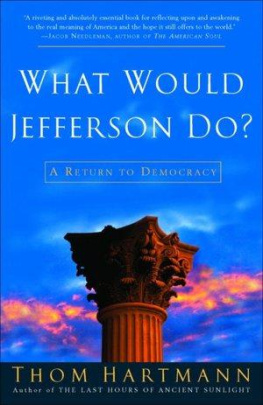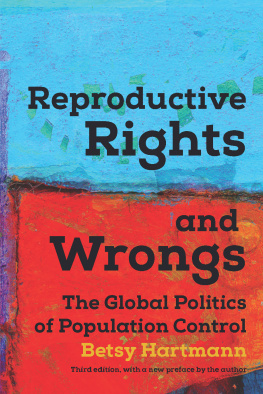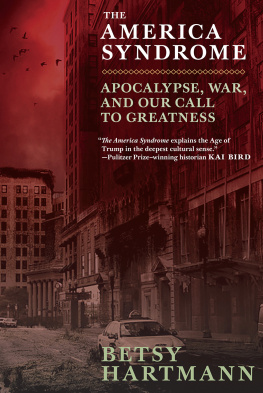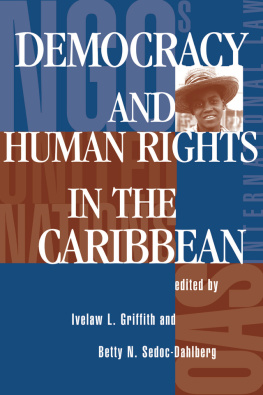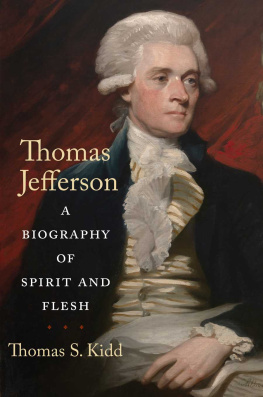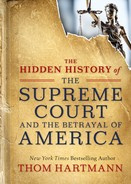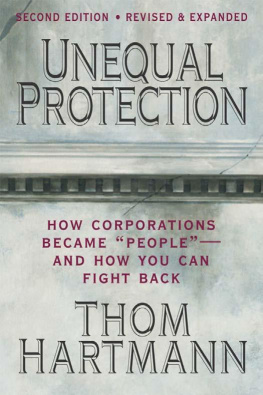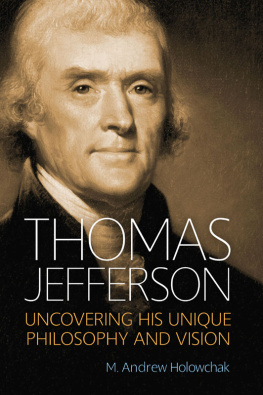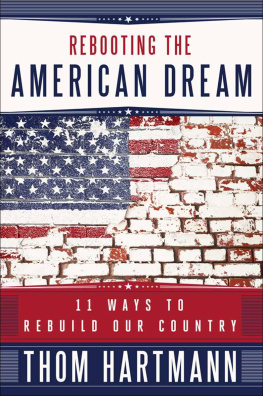ACKNOWLEDGMENTS
Are the special privilege boys going to run the country, or are the people going to run it?
PRESIDENT HARRY S. TRUMAN(19451953)
I t may seem strange to express gratitude to somebody dead nearly two centuries, but the simple reality is that without Thomas Jefferson neither this book nor our nation would exist as they do today. I acknowledge not only the greatness of his mind, but the extraordinary amount of research he did, which captured for all time an extensive library of thought that might otherwise have been lost to us.
Several years ago Louise and I bought an 1850 Gothic house in central Vermont, where we now live. Going through the dusty attic over the carriage house, we found a 20-volume set of The Works of Thomas Jefferson, published in 1904 in Washington, D.C., by the Thomas Jefferson Memorial Association.
I'd read several biographies of Jefferson during the course of my life, and back in 1974 I particularly enjoyed Fawn Brodie's classic Thomas Jefferson: An Intimate History (which I still consider the best Jefferson biography ever written). More recently, I've been saddened by the distortions of his perspective and life that I've repeatedly found in the more recent Jefferson biographies and books about his era, most coming from historians or authors who are also political or philosophical conservatives.
But finding a complete collection of Jefferson's own wordsas opposed to works about himwas a life-changing event for me. I thought I knew something about Jefferson, but nothing prepared me for the impact of reading his personal and private correspondence straight through in large chunks.
These fragile and badly time-damaged books led me to discover on the Internet several nearly identical collections of this now-public-domain collection in easily searchable digital form on CD-ROMs. His Autobiography, his Notes on Virginia, and his thousands of letters offer a compelling insight into the mind and soul of one of America's most extraordinary men, and I've spent much of the last decade immersed in them. All of the unfootnoted quotes in this book by Jefferson and his correspondents (Adams, Lafayette, etc.) come from these original-source collections.
In addition to Jefferson's inspiration, I was helped in completing this book by the extraordinary editorial skills of Toinette Lippe, herself an accomplished author whose books I recommend to you.
Joe MacPherson, who worked for some months as producer of my radio program, provided useful research that has found its way into this book, and Rob Kall, whose online quote collection at www.futurehealth.org is extraordinary, provided some great epigraphs and ongoing encouragement. Jim Walsh did great work as an editor and proofreader, and many thanks also go to my old friend Jerry Schneiderman.
And Dave deBronkart, an old and dear friend who has edited several of my other books, spent an extraordinary week with me just when I thought this book was all finished and ready to submit, for which I am extremely grateful. This book is substantially better for his efforts.
To all, and particularly to Louise Hartmann, who kept me on task through the years it took to research and write this book, I offer my most heartfelt thanks.
ALSO BY THOM HARTMANN
The Prophet's Way
Attention Deficit Disorder: A Different Perception
Focus Your Energy
Beyond ADD
Best of the DTP Forum
(edited with Brad Walrod and Don Arnoldy)
ADD Success Stories
Think Fast!
(edited with Janie Bowman and Susan Burgess)
Healing ADD
Thom Hartmann's Complete Guide to ADHD
Unequal Protection
ADHD Secrets of Success
The Greatest Spiritual Secret
The Last Hours of Ancient Sunlight
The Edison Gene
We the People
AFTERWORD BY ROBERT WOLFF
W hen Thom and Louise came to visit me here in Hawai'i, a few years ago, we must have talked story, as we say here, for many hours. I know we talked about indigenous and aboriginal peoples and how different their way of life is. I have lived among non-Western people most of my life and still find it diffcult to live in our Western world. Yes, indigenous people are often poor, compared with us, but they live within the limits of their environment. They may not have all the gadgets and gimmicks we have, although almost everyone in the world now has heard radio and seen television, but native people, even now, have a different way of being with each other. People are more equal than we are in the West. Men do not dominate; in many countries of Southeast Asia, women are the entrepreneurs, not men. Children are wanted, cherished everywhere, and never owned as we think of ours. Children are not only seriously listened to, but heard. People accept and respect one another for who they are. Disagreements are worked out verbally, without courts and almost always without violence.
How else could we have survived for a hundred thousand years and more?
I grew up in Indonesia with people whose culture stressed the importance of never telling another what to do. In that culture a mother will ask a child of three if she wants to take this medicine. If the child says no, that's it. Parents do not have ambitions for their children other than to help them become who they are born to be.
We have lost that feeling of equality; we are forced to think hierarchically. Someone has to be the boss. Someone must own. Ursula K. Le Guin in one of her books says, Owning is owing; having is hoarding. True, but we have forgotten. We have forgotten so much! Lost under layers of shoulds and mustn'ts. Lost because we have become used to being entertained instead of living our lives. Huge industries producing entertainment including advertising and propaganda have created a world that is not human any more.
In 1960 I was a research associate professor at the University of California, San Francisco Medical Center. They sent me and my family out to Malaysia to do research in dietary behavioras a wit said, why people eat what they do and not what they should. I am a social psychologist and I speak Malay, the language spoken in Malaysia and Indonesia. I worked in a few villages that I visited regularly, finding again the world I had known as a child. Proud and kind people, patient, unambitious in our eyes perhaps, but knowing themselves rich in their culture. Never arguing, but discussing important matters in what must seem to a Westerner almost a dreamlike way: a word here, a short sentence, long pauses. People saying what is in their heart; people really listening to what is in other people's hearts. And always: respect.
In the West, discussions are often monologues; while someone else is talking we are formulating what we want to say when we can interrupt.
My daughter-in-law is from an island in the South Pacific. Their language has no word for thank you because, as she explained, Of course we help when it is needed, why should we thank? We help each other!
In Malaysia, quite by accident I meet the Sng'oi (also written Senoi), one of the tribes of the aboriginal peoples of Malaysia. It is still hard to express what I felt when I first met these simple, almost naked people. Their smiles... their wide open faces. A sense of recognition, something deep down...
Later I discovered that all travelers and writers who met other aboriginal people in Africa, in Australia, in other parts of Asia, and in South America, had very similar experiences. My favorite account is Peter Matthiessen's in his book The Tree Where Man Was Born. He and a companion meet a small band of Hadza, an aboriginal group of East Africa:
Shy, they await in a half-circle, much less tall than their bows.
Next page
